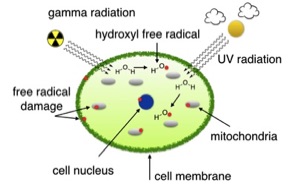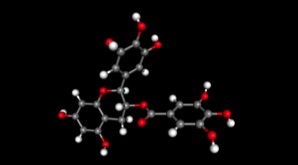Free radicals, antioxidants and radiation damage
Ionising radiation has sufficient energy to break the bonds of water molecules in human tissue resulting in the formation of hydroxyl free radicals. These highly-reactive compounds initiate a cascade of chemical reactions resulting in damage to key biomolecules, such as lipids, proteins and DNA, which ultimately lead to cell death. Whilst a potent treatment to destroy tumours, the surrounding
tissue can also be damaged.
Antioxidants annihilate free radicals thereby protecting cells from free radical damage. However, to act as effective radioprotectants antioxidants need to be designed to target the locations within the cell most susceptible to free radical attack, such as the mitochondria and cell membrane, whilst not impeding the ability of the radiation to destroy the tumour.
Cell ProTx management team combines extensive expertise in the fields of oncology, redox chemistry and free radical biology and medicine as well as significant commercial experience of the Life Sciences sector.
Chief Scientific Officer and Director
Heather Wallace (PhD, FRCPath, FBTS, FRSC, FSB, FBPhS) is Professor of Biochemical Pharmacology and Toxicology at the University of Aberdeen, a European Registered Toxicologist and is currently President of the British Toxicology Society. Heather's research interests are in selective drug delivery as a means of minimising unwanted side effects of cancer therapy and is a leading expert in the role of polyamines in governing cell growth and apoptosis, and their applications in oncology.
Chief Operating Officer and Director
Donald McPhail is a chemist specialised in the design of novel antioxidants to treat diseases of oxidative stress and mitochondrial dysfunction. He is an inventor on three US-granted patents covering composition-of-matter and use of a large portfolio of new chemical entities with proven high-levels of efficacy in protecting cells from free radical damage and loss of viability. A former recipient of a Royal Society of Edinburgh Enterprise Fellowship, he has gained extensive experience in relation to the operation of life sciences SME's.
Laboratory Manager
Graeme Cook holds a First-Class Honours in applied chemistry from the Robert Gordon University. Since graduating in 2005, he has been employed within the biotechnology sector on a range of commercially-focused R&D projects. Graeme has played a key role in establishing a range of in vitro oxidative stress assays to determine the structure-activity relationships of novel redox molecules. These have been used for the validation and succesful granting of medicinal chemistry patents of which he is also a named inventor.

